The Bible and the SDGs
17 DAYS - 17 GOALS - 17 BIBLE REFLECTIONS - 17 PROJECTS - 17 ACTIONS
#BibleSDGs
Day 1
Sustainable Development Goal 1 - No Poverty
None in need
In the shalom reality of God’s kingdom no one is in need
In its earliest days the early Church manifested the fulfilment of the Old Testament ideals within the concept of shalom: “All the believers were united in heart and mind. And they felt that what they owned was not their own, so they shared everything they had… There were no needy people among them, because those who owned land or houses would sell them and bring the money to the apostles to give to those in need.” Acts 4:32,34-35. They did this because of their faith in Jesus as the anointed one, the Lord, the Prince of Peace (shalom), who makes shalom a social reality by the transformative power of the Holy Spirit at work in the followers of Christ.
In Luke 4:18-19, when Jesus claimed to be the fulfilment of the vision of Isaiah 61:1-2 (to bring good news to the poor and the release of captives), the coming shalom reality is what He had in mind. As James makes clear in his epistle, equity must be a hallmark of every local church. Our collective communal strength in-Christ then becomes a blessing of public good to others in need. From our love for God and one another flows our love for neighbour and ‘enemies’. From our common wealth as followers of Christ, we challenge injustice and we meet the needs of the poor. In-Christ the oppressed are freed and economic harmony can be created as a witness to the world of the now/not-yet time of the Lord’s favour (Luke 4:19).
Featured Project

What You Can Do
Open your eyes to the reality of poverty - right where you live. Find out about poor people in your own community, pray for them and develop a practical idea of how you can lovingly share and care.
Day 2
Sustainable Development Goal 2 - Zero Hunger
Satisfied stomachs
God provides nourishment to those who ask
When Jesus said, “I am the bread of life. Whoever comes to me will never be hungry again. Whoever believes in me will never be thirsty” (John 6:35), it was not merely a metaphor. He promises to provide for those who would believe in Him (John 5:36). The regular provision of our collective “daily bread” (Matthew 6:11, Luke 11:3) is a promise of sustenance as part of the life in all fulness that Jesus imparts to those who follow Him (John 10:10) and remain in Him (John 15:4, Philemon 1:6). This promise is as real today as the day Jesus fed the 5,000 with five loves and two fish (Matthew 14:15-21 etc.).
God provides (Psalm 107:9, 147:14), but a new covenant rendering of the Deuteronomic principle (e.g. Deuteronomy 6:3) applies here: the promise is contingent on obedience—to Christ. The promise of provision under the new covenant is to the Christ-centred community of God’s people. Yet, as God supplies so we are obligated to share, not just with one another but with our neighbours in need. In our new covenant shalom reality, Christ-followers are empowered by the Holy Spirit to fulfil God’s injunction through Isaiah 58:6-14, which includes “Share your food with the hungry, and give shelter to the homeless. Give clothes to those who need them…” (Isaiah 58:7). Generously sharing God’s provision to us with those in need in wider society is a beacon of God’s light in a world grappling with darkness (Isaiah 55:1-3).
Featured Project

What You Can Do
Find out more about global hunger, pray for hungry people and let your heart be moved by a specific hunger-reducing project.
Day 3
Sustainable Development Goal 3 - Good Health & Wellbeing
Wholeness restored
Wellbeing in God’s shalom kingdom is a restoration of all relationships
The “shalom” of God is shorthand for spiritual, social, economic and personal wellbeing. It is one of those now/not yet promises of God through Christ. The Apostle Paul knew what it meant to physically suffer, yet he encouraged followers of Jesus to “Always be full of joy in the Lord. I say it again—rejoice!” (Philippians 4:4) and not to “worry about anything; instead, pray about everything. Tell God what you need, and thank him for all he has done. Then you will experience God’s peace, which exceeds anything we can understand. His peace will guard your hearts and minds as you live in Christ Jesus.” (Philippians 4:6-7).
This peace offered by Christ is of a kind not experienced elsewhere (John 14:27). This shalom peace is the centre of our wellbeing in Christ. It is not merely a psychological calmness and rest from life’s concerns, it is a state of being in right relationship with God (righteousness), our histories (reconciled heritage), ourselves (personal health), one another (fellowship), wider society (civil mindedness), and God’s creation (stewardship). Healing speaks of the repairing of relationships that have been damaged, whether it be some dysfunction within our bodies, malfunction in our interpersonal interactions, or harm to the environment. This is why confessing for our involvement in damaging relationships is related to physical healing, whether of our person or our environments (see James 5:13-18). A healed, healthy and whole local church, practicing its wellness out in wider society, is an example to the transformative power of God at work in our midst (Matthew 10:8, Luke 9:2, 10:9), especially as it ministers to those on the margins whom society considers unhealthy (Luke 5:31).
Featured Project

What You Can Do
Find out more about a sick person in your neighborhood: What are the specifics of the ailment? What helps? What doesn't?. Pray for that person. If possible, visit that person. Otherwise write a letter, text or give the person a phone call.
Day 4
Sustainable Development Goal 4 - Quality Education
Whole of life learners
Education is key concern for life in Christ
Jesus was known as ‘teacher’ (Rabbi) because education (about the counter-intuitive ways of God) was at the heart of His ministry on earth. No better is this seen than in His invitation to “Come to me, all you who are weary and burdened, and I will give you rest. Take my yoke upon you and learn from me, for I am gentle and humble in heart, and you will find rest for your souls. For my yoke is easy and my burden is light” (Matthew 11:28-30). Throughout the whole narrative of Scripture the people of God are called to be learners of God. As God taught Moses (Exodus 4:12) so the Holy Spirit teaches us (John 14:26) and we are to teach one another (2 Timothy 2:2), rooted in the Scriptures (2 Timothy 3:16). That is not to say that formal education is of no use, but the people of God are called to be wise (Matthew 7:24, Ephesians 5:15) and discerning (Proverbs 1:5, Daniel 2:21, Hosea 14:9), not simply knowledgeable (1 Corinthians 8:1).
Throughout Church history, followers of Jesus have led the way in providing quality education as an extension of our mission to be makers of disciples of Christ, learners of Jesus. The purpose of which is to find rest. Again, this is an attribute of the shalom peace God offers us in Christ. As we learn to live in Him and by His ways, so we experience the blessings that follow. This education is both spiritual and material in its application. Learning God’s wisdom (James 1:5, 3:13-18) is character building (ethics), flows into wider society towards mutual flourishing (morals), with practical application (vocation) for the benefit of all society. Education focused on these life-affirming elements should be made accessible to all for the building up of human dignity and civic wellbeing.
Featured Project

What You Can Do
Renew your own emphasis on education. Are you growing in knowledge and wisdom? Which habit could you (re-)install to nurture this growth? And for which person in your neighborhood could you become an educator this week - sharing your acquired knowledge and wisdom?
Day 5
Sustainable Development Goal 5 - Gender Equality
God created them
All power differences are neutralised in Christ
Human beings are created in God’s image as spiritual persons with physical bodies. Those bodies were designed from the beginning to be distinguishable as male and female (Genesis 1:27), with higher regard than the rest of creation, carrying responsibility for creation (e.g. Psalm 8:5-6). All humans, regardless of gender, are endowed with God-likeness capacity to love, create and serve in unique and purposeful ways. This is central to our dignity as human beings with intrinsic value to God. Women feature strongly throughout the Biblical narrative and in Jesus’ life and ministry. Matthew, writing his gospel after the ascension of Christ, took care to note females in Jesus’ lineage. Prominent women were at the forefront of building the early Church (e.g. Acts 17:4,12, Philippians 4:3).
Each gender contributes to the benefit of the whole community (Romans 12:6-13). Human systems in many parts of the world have developed in such a way that they privilege male over female, and sometimes female over male. In Christ, these privileges are equalized (Galatians 3:28). Mutual submission is the standard of all relationships in Christ, no less so gender relationships (Ephesians 5:21ff). As local churches invest in the development and vocation of all members (Titus 3:8), honouring all equally regardless of gender or other differences, this can show wider society how it too can benefit by deconstructing systems that would hold some back from participating to their full potential in society.
Featured Project

What You Can Do
Watch your language. Gender equality starts with what we say and how we say it. Place a specific mindfulness on gender stereotypes in your conversations today.
Day 6
Sustainable Development Goal 6 - Clean Water & Sanitation
Water is life
If anyone is thirsty let them come
Cultures around the world view water with a sacred respect. It is known for its life giving and cleansing abilities. Little wonder then that Jesus promises to “give freely from the springs of the water of life” (Revelation 21:6) to all who are thirsty. In his gospel, John clarifies that the living water Jesus offers refers to the Spirit of God (John 7:39), but the association with physical water should not be dismissed. Without clean water there can be no life (Exodus 17:3). The free provision of abundant water is a sign of the shalom goodness of the reign of God (Deuteronomy 8:7, Psalm 65:9, Isaiah 55:1, Ezekiel 47:9, Revelation 22:1-2). Access to clean water is an inalienable right under God for all humans (Matthew 5:45), it should not be denied and it should not be commoditized and sold unjustly.
Similarly, the provision of hygienic disposal of waste. It is for good reason that unholy sites in Scripture were used as places to discard waste (e.g. 2 Kings 10:27). Gehenna (the valley of Hinnom) outside of Jerusalem was one such place (often translated “hell” as in Matthew 5:22,29-30 and 10:28). Once the site of perpetual child sacrifice by burning, the valley became the rubbish dump of the city, synonymous with the destiny of the wicked. “Cleanliness is next to godliness” (John Wesley) is a well-known saying, but the idea is associated with the purification rites of many religions, Biblical religious observance among them. We should not take modern sanitation conveniences for granted but work to make cleanliness possible for all. Although, as we do, we should be careful not to create such a sanitised lifestyle that we miss the importance of burning waste metaphors related to the mortal dangers of behaving contrary to God’s standards of right living (Luke 12:5).
Featured Project

What You Can Do
Count how many times you used water during the day (whether it is to brush your teeth, wash the dishes, wash your hands, flush the toilet or even to drink). Share that number on social media and based on your
number make a post about how important water is in our daily lives.
Day 7
Sustainable Development Goal 7 - Affordable & Clean Energy
You will receive power
Invest your energy wisely
Aside from the physical energy available from most human bodies, the earliest forms of energy available to humanity were fire, flowing water, wind and domesticated animals. Harnessing these forms of energy enabled humanity to develop, create and construct. The earliest Biblical record of the use of fire was to make bricks to construct the tower of Babel (Genesis 11:3). This is a prime example of the potential for the use of energy to be corrupted and applied to something contrary to God’s right ways. As time progressed, humans found increasingly inventive ways to harness energy and to (now) store it—for the good of all but also for the oppression of others.
Creating energy for the convenience of the masses has come at a terrible cost to God’s good creation. Carbon emissions are one example. Wrongly applied nuclear energy can also have terrifying consequences on creation and its inhabitants. Even harnessing solar power can create problematic waste as can electricity stored in battery-powered devices and vehicles, even if electricity itself is cleanly created by hydro dams. All humans have a responsibility to care for the domains that we inhabit as a gift from God. That means we must balance our use of energy from the material world with care for the material world (Genesis 1:26-30). Furthermore, good stewardship of the gifts of God extend to ensuring that everyone benefits from those gifts equitably (Psalm 115:16), so Jesus-followers not only need to be concerned about how we create and use energy but also how we ensure it is available for the good use of all.
Featured Project
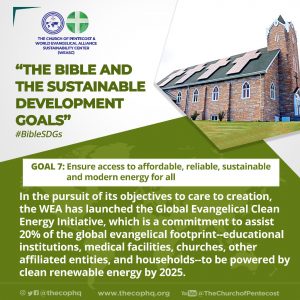
What You Can Do
Switch off lights and appliances when not in use. When leaving a room make sure all elements are switched off. Use natural light to brighten a room.
Day 8
Sustainable Development Goal 8 - Decent Work & Economic Growth
Labour not in vain
Human dignity is to work for good
Being made in the image of God (Genesis 1:26), all humans have the capacity to create. Core to our dignity as human beings is our ability to direct our energy and time into creating value for, and contributing to the wellbeing of, the habitats (including the societies) in which we live (Genesis 1:26-28). As a result of the disobedience of the first human couple, the effort we need to put into making our livelihood was increased, and what was to be a pleasurable experience would now require the “sweat of your brow” (Genesis 3:19a). Techniques and technologies have eased this burden greatly, but the material world still does not yield results as easily as it was originally designed to do. Yet, work we must, or else we do not get to eat (2 Thessalonians 3:10). The idle are regularly rebuked in Scripture and the consequence of laziness is ruin (e.g. Proverbs 26:15, Ecclesiastes 4:5, 10:18).
In spite of its hardship, God has created us to enjoy the outcomes of our labour (Psalm 128:2, Ecclesiastes 3:13, 2 Timothy 2:6). For the followers of Jesus, the desirable outcome should not be for personal profit, for whatever surplus we have should be shared with others. In this, God has freed us in-Christ from a ‘scarcity attitude’ where we compete for and withhold what we acquire, and jealously desire what others have (Deuteronomy 5:21). Besides, the reward from our labour in obedience to the Lord is not earthly gain but eternal (Matthew 6:1, 1 Corinthians 3:8 & 15:58, Philippians 1:22, Revelation 14:13). Followers of Jesus with means to provide employment for others ought to do so with the attitude of generosity and grace at work in us by the Holy Spirit. While the master/slave relationship is no longer acceptable, the same relationship principles apply to employer/employee under the new covenant (Ephesians 6:5-9, Colossians 3:22-4:1). When we develop our dignity and enhance the dignity of others through working and offering work, for the betterment of society, we manifest the shalom of God.
Featured Project

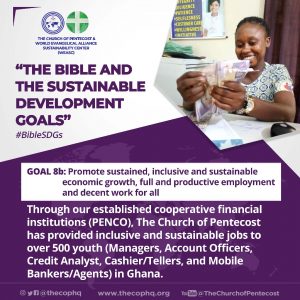
What You Can Do
Reflect on the multiple functions and blessings of a good job (income, sense, inter-human contact, structure for the day, etc.). Pray for a person in your neighborhood who currently has no job or who suffers from poor working conditions.
Day 9
Sustainable Development Goal 9 - Industry, Innovation and Infrastructure
Build to flourish
Create systems to benefit all
Where the application of energy and work is harnessed in ways that create inequity, the followers of Jesus are obligated to expose it as injustice. Oppressing workers for profit and consuming material resources unsustainably are contrary to God’s right ways. The Old Testament prophets and Jesus Himself were against the abuses of the rich and powerful for their exploitative ways (Amos 4:1, Zechariah 7:10, Luke 18:22-25). The privileged of this world usually establish and fight to maintain systems that reinforce their positional power and wealth. There is no place for such systems in the shalom kingdom of God.
Even Jesus, the Son of God, the most privileged person to walk the earth, did not consider His position and power something to be grasped or wielded but instead He laid it aside and became servant of all. He surrendered His will to God and God rewarded Him (Philippians 2:6-11). The infrastructures Jesus-followers create to conduct our work must be built on the same principles. Our God-given creative capacities should be employed for the betterment of others and our societies. Our energies and resources invested in production ought to serve God’s greater good in making a better world for the generations who are to follow. This is our labour for the Lord (Colossians 3:23-25) — even protesting unjust industry, innovations and infrastructures.
Featured Project

What You Can Do
Reflect on how just industry, innovation and infrastructure are handled in the country you are living in. What would need to change to make systems benefit all? Pray for the result you came up with and speak to someone about it to pass on the idea.
Day 10
Sustainable Development Goal 10 - Reduced Inequalities
No favourites
Privilege comes with responsibility
It is said that the Biblical narrative reveals that God has a preferential concern for the poor and marginalised of a society. While that can be interpreted through one lens, a more accurate view would be that God has a predisposition against the rich and powerful. Since God shows no favouritism (Matthew 22:16, Acts 10:34, Galatians 2:6), the poor and marginalised cannot be given any more value as humans than anyone else. However, the rich and powerful too easily take and withhold value for themselves, against God’s right ways, and God resists their self-centred mockery and pride (Proverbs 3:34, 18:11-12, James 4:6, 1 Peter 5:5). Wealth in itself is not evil, it is a mark of God’s blessing throughout the Old Testament (1 Chronicles 29:12), but the Biblical narrative also reveals how dangerous wealth can be as an end in itself, acquired through unholy means (Micah 6:12, Amos 8:4–6) and used to “crush the needy” (Amos 4:1, see also Isaiah 3:15 for another example). Jesus was particularly concerned about power inequities caused by material wealth (e.g. Matthew 19:16-30) and societal positions (e.g. Luke 6:24-26) because their priorities were not aligned with those of God’s shalom kingdom. In contrast, those who follow Christ are equal in God’s sight, sacred siblings (Matthew 23:8).
Shared generosity frames the economy of God’s people in Christ (2 Corinthians 8:12-15). Mutual honour governs the behaviour of our relationships (Romans 12:3, Philippians 2:3). Reciprocal good lies at the heart of Jesus’ insistence that we do to others what we would have them do to us (Matthew 7:12, Luke 6:27-31ff). The power of the Holy Spirit at work within communities of Jesus-followers creates an ethic of equality where none is in need and diverse giftedness and contributions are celebrated (Romans 12 and 13). Our love for one another, in practical ways, cannot but help to show wider society the benefits of treating each other as equals. It is a prophetic example that should serve as a warning to the selfish and arrogant rich and powerful, and an invitation to the poor and marginalised.
Featured Project
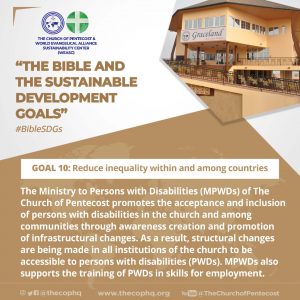
What You Can Do
Find out which policies in your country aim to reduce inequality. Which groups should be supported by these instruments? Pray for these people.
Day 11
Sustainable Development Goal 11 - Sustainable Cities & Communities
The city of light
Places of mass population carry good potential
Ever since humanity clustered in one locality it has been the source of great concern to God. Founded by Cain, Enoch is the first city mentioned in Scripture, but the earliest example of the functioning of a city is that of Babel (Genesis 11:1-9). Babel was a settlement that sought to create a tower as a symbol of their pride, a flood-proof solution to protect them in their intention to rebel against God’s command for people to fruitfully multiply throughout the earth. That plot was foiled by the creation of languages, a mercy so that people would seek God in their myriad habitations (Acts 17:26-27). Babel/Babylon is symbolic in Scripture of the propensity for evil in a city. In contrast, Jerusalem is symbolic of a God-honouring city, governed by the ethics of shalom.
While the dwelling of the first people was a garden (Genesis 2:8), the destiny of the masses resurrected to eternal life will be a peace-filled city-paradise under the rulership of Christ (Revelation 21:1-22:6) in fulfilment of ancient prophecy. Cities are places uniquely suited to people seeking God. People who migrate to cities from their ancestral homes experience a dislocation that is disorienting. They become disconnected from old systems and open to new meaning and purpose beyond the economic motivations that draw most into cities. Communities of Jesus-followers co-existing amongst the cosmopolitan masses can provide a wonderful sense of belonging for city dwellers, to the ultimate good of the entire city. The people of God are to manifest the shalom of God in the city and work to see it prosper for everyone’s benefit (Jeremiah 29:7). Part of helping a city to prosper is to expose the social evils and injustices that exist to consume resources and oppress the underprivileged, systems that create ill health and affect overall wellbeing. The interactive, life-affirming, dignity-building, community of Jesus-followers should stand in prophetic contrast, as a living example of what the city should aspire to become and a foretaste of the coming reality of God’s shalom kingdom, metaphorically depicted as a holy city.
Featured Project
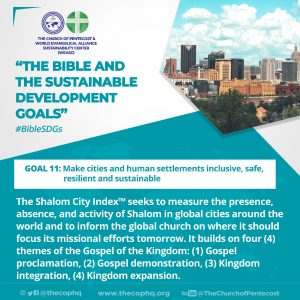
What You Can Do
Read the Shalom Index profile of a city you know well. Prayerfully discern how more shalom could be brought to this city.
Day 12
Sustainable Development Goal 12 - Responsible Consumption & Production
Only what you need
Produce for wellbeing, consume for sustenance
“You cannot take it with you” is a common English proverb drawn from Psalm 49:16-17. It is said with moral intent to reorient people away from material acquisition in this life toward concern for that which is of advantage for our eternal life. Luke quotes Jesus saying, “What good is it for a man to gain the whole world, and yet lose or forfeit his very self?” (Luke 9:25). Humans are created to produce, to be fruitful. That includes reproduction (Genesis 1:28, 9:17), character development (Galatians 5:22-23), and skilled creativity (e.g. Exodus 28:3) in honour of the Lord (Proverbs 3:9, Colossians 3:23). Neither our production nor our consumption should be used for our own gain. We are right to receive satisfaction and material reward from our labours but our primary responsibility is to take only what we need for healthy living and invest any surplus into the wellbeing of our communities and environmental habitats for the benefit of wider society and future generations. This is our “dominion” or “rulership” responsibility as humans entrusted with this earth (Genesis 1:28-30). It is a guardianship responsibility, to protect and nurture creation (Genesis 2:15), to help our world and everything that lives in it to flourish. To do otherwise is to give in to self-centred human nature that resulted from the corruption event of Genesis 3.
A manifestation of that corruption is greed. Jesus spoke powerfully against greed and the unproductive storing and defence of surplus (Luke 12:13-21) as it diverts a person’s devotion away from God. In contrast, followers of Christ participate in God’s shalom kingdom where we are called to remain in constant dependence on God as our provider, receiving from God what we need and freely sharing our surplus for the common good of all (Luke 12:22-34). This sounds foolish to those of ‘this world’, a utopian fantasy. Without God, it is. Humanitarians may attempt this experiment and fail proving it cannot be done. Jesus was very clear, “With humans this is impossible, but with God all things are possible” (Matthew 19:26, Mark 10:27). The New Testament is clear: Jesus-followers, enabled with the power of the Holy Spirit, have the ability to dwell in such a shalom kingdom reality and a responsibility to show the world what it’s like, so they will know and believe (John 17:21,23).
Featured Project
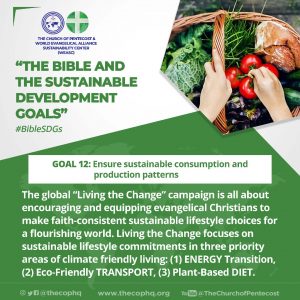
What You Can Do
Visit the "Living the Change" campaign website and make a personal sustainable lifestyle commitment motivated from a heart of faithful discipleship.
Day 13
Sustainable Development Goal 13 - Climate Action
Nurture all of nature
Embrace creation as an extension of our collective selves
We acknowledge God as the Creator of all things (Genesis 1 and 2) and Christ as the person through whom God created, and who holds all things together (Colossians 1:15-17). By His miracles, especially rebuking the tempest on the lake, He showed himself Master of the elements. This is who we serve as Jesus-followers and we share a responsibility to look after the creation entrusted to humanity by God (Genesis 1:28-30). There is no sound Biblical argument for wholesale destruction of our earthly habitats for profit. Followers of Christ complicit in doing so have forgotten that they are accountable to the Creator and it gives cause for “unbelievers to blaspheme the name of God because of you” (Romans 2:24). Disregard for the created order runs counter to who we are as the People of God.
Climate has always been a great concern for humanity. A shift in climatic conditions can mean the difference between a bumper harvest or a famine. Many cultures attempt to control environmental conditions through religious observance, and the Bible connects obedience/disobedience to God in similar ways (Deuteronomy 11:13-15). While the rain falls on the just and unjust alike (Matthew 5:45), faithful followers of the Creator are assured bountiful yields from favourable climes. More recently though, industrialisation has had an increasingly negative affect on the environment and consequently on the world’s weather systems. Is it any wonder then, if we neglect to care for creation as industrialisation has done, that we reap the consequences of disobeying our Genesis mandate to nurture nature?
Is negative climate change not a result of lack of faithfulness to God? Industrialisation grew from an unholy separation of humanity from the rest of creation, but human beings are not autonomous beings, we are all part of delicate systems that deserve to be honoured and cared for as we would our own being. It was not for mere metaphor that the writers of Scripture often personified the created order. It pulses with the life of God. John was not just being poetic when he claimed that stones could produce children of Abraham (Matthew 3:9) neither was Jesus when he declared stones would cheer Him if no one else would (Luke 19:40). Even stones resonate with the creative life of God. We have a forgotten intimacy with our surroundings, as extensions of our very selves, and climate change is merely one indicator reminding us of how fragile that relationship can be.
Featured Project

What You Can Do
Have a family/community black out for one hour. Share what you are doing in the hour on your social media channels.
Day 14
Sustainable Development Goal 14 - Life Below Water
Let the waters swarm
Care for life teeming beneath the waves
Industrialisation has made it possible to empty the oceans of sea life faster than ever before and consumption is polluting the oceans faster than ever before — consumption is accelerating both. It is relatively easy to understand our responsibility to care for the needs and desires of the growing number of people inhabiting the earth, but unless we also care for life beneath the waves we will suffer the consequences. The Psalmist spoke of an “ocean, vast and wide, teeming with life of every kind, both large and small…” (Psalm 104:25), but at the rate commercial fishing is proceeding, the seas will not teem for long.
Just because we rarely see beneath the sea does not mean it is not important to God or our own wellbeing. We have very little awareness of life in the oceans depths. The very English word “unfathomable” is an oceanic term applied to God as it is to the oceans: unknowable (Job 38:16). The earth is an intimately interconnected biodome and sea life extinction and pollution create chain reactions that are only recently being fully understood. The story of Jonah is an important case in point. Not only did God cause the climate to react to Jonah’s disobedience but the story also illustrates God’s involvement beneath the waves, ordering a giant fish to redirect Jonah according to God’s purposes (Jonah 1:17, 2:10). So precious is life beneath the waves that Psalm 148:7 calls on the great sea creatures and all that inhabit the oceans depths to praise the Lord. These precious created beings (among others) are put into our charge (Psalm 8:6-8). All humanity will bear responsibility for their care, as we will for our treatment of all creation, at the great judgement (Revelation 11:18).
Featured Project
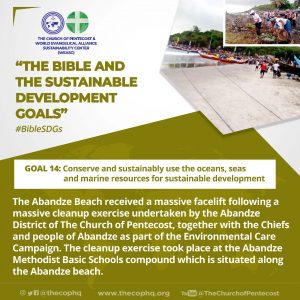
What You Can Do
Browse the website of the PlasticBank to find out more about the global problem of ocean plastic. Calculate your plastic footprint and start becoming the solution to ocean-bound plastic.
Day 15
Sustainable Development Goal 15 - Life On Land
Tend and watch over
The life of every living thing is in God’s hands
Speaking of the end of days, Jesus notes that the nations throughout the earth will be in turmoil and that people will be terrified in their habitations (Luke 21:25-26). Some versions render the different Greek words together as earth or world, but they represent two understandings of life above the waves. The first (ge, v25), refers to land with its material uses and metaphorical allusions as a place of profane frailty in contrast to the holy power of heaven—it speaks generally of the basest aspects of our humanity. The second (oikoumene, v26), is much broader and interconnected. It speaks of populated dwelling places or realms, with a focus on inhabitants—a common home, if you will.
When we think of our Genesis 1:28 responsibility to take care of God’s creation, we do well to think of the entire earth biodome as our home. We live in a delicately interconnected ecosystem that was specifically created and finely tuned by God to support life. This is wonderfully illustrated by Psalm 104 and knowledge of this should cause us to join the by singing praises to the Lord for as long as we live. In light of the wonder of God’s creation, the Psalmist condemns the wicked, wishing all sinners would vanish from the face of the earth. There is a strong implication here that those who mistreat the good creation of God are the wicked sinners being referred to. In contrast, those of us who live in Christ Jesus, who have been freed from the consequences sin and death, should be at the forefront of caring for all living things within our domains. A fair interpretation of Romans 8:21-22 suggests that creation has been longing for our appearance. Of course, there is a full and final fulfilment of that longing but in the meantime we have the power and the responsibility to tend and watch over all that God has entrusted to us now. After all, it is our home and we do well to do all we can to preserve and prepare it for its final renovation when the glory of the Lord will be revealed in it (Isaiah 6:3).
Featured Project
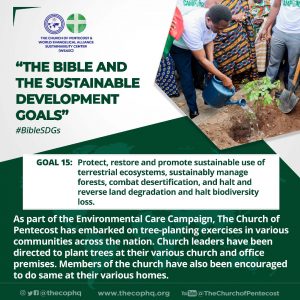
What You Can Do
Plant a tree. Make sure that it is indigenous and water wise. Commit to watering it for the next two years.
Day 16
Sustainable Development Goal 16 - Peace, Justice & Strong Institutions
Shalom is our destiny
Institute harmony with righteousness and justice
Isaiah 9:6-7 speaks of a leader whose rule and reign exemplifies righteousness and justice. This is attributed to Jesus and one of the titles of that leader is the “Prince of Peace”—ruler of shalom. Jesus offers a peace that the world (outside of God’s shalom kingdom reality) cannot provide (John 14:27). Peace offered by the world is maintained by external rule of law, painfully enforced. The peace that Jesus offers is created by an internal transformation. Jesus’ shalom is made available only to those who follow Him, for it is a gift that is provided by the Holy Spirit filling the life of those who are allegiant to Christ alone (e.g. John 14:24-26, Acts 1:8). Wider society can benefit in a secondary way through the goodness of Jesus-followers living amongst them (1 Peter 2:12), but the heavenly peace of the Christmas carols is an experience unique to those who trust in Jesus as Lord. Jesus-followers are empowered by the Holy Spirit to fulfil the expectations of righteousness and justice spoken of throughout the Old Testament. There, God is characterised by righteousness and justice, faithfulness and loving kindness (Psalm 89:14). The Holy Spirit is God in followers of Christ working the character of God through us (Galatians 5:22-23) in our lived experience, so long as we obediently allow the Spirit to transform our nature.
Righteousness describes living according to God’s ethical standards, justice is activity that works to align our lived realities to those standards. Empowered by the Spirit of God to live according to these standards, and prophetically calling others to do likewise, is part and parcel of being a disciple of Christ. Wherever we gather and organise ourselves as churches, groups of Jesus-followers should evidence God’s ideal for loving community through the way we craft our institutions. In this, our aim is to provide an example to the world of equitable and right living—living out Jesus’ prayer that we be one (John 17:20-21).
Ultimately, all people will be judged according to God’s good standards. One dramatic scene in Scripture that describes the great judgement is found in Revelation 14:7 where every nation, tribe, language, and people are called to “Fear God… Give glory to him. For the time has come when he will sit as judge. Worship him who made the heavens, the earth, the sea, and all the springs of water.” Note carefully that the judge is known as the creator of the domains humans have been mandated to care for. Our work for justice needs to be oriented toward right relationships with all of creation, instituting harmony (peace and reconciliation) between all things—for this reason Christ Jesus died, was resurrected, ascended and will return to complete. This is the now/not yet shalom kingdom of God.
Featured Project
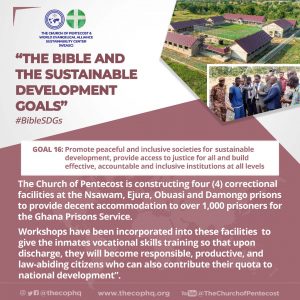
What You Can Do
Reflect on how peaceful and just life in your neighborhood is. Pray for situations in which peace and justice is missing and receive strength and ideas to become a peacemaker yourself in one of these situations.
Day 17
Sustainable Development Goal 17 - Partnerships For The Goals
All things work together
Seek peace, do good and prosper where planted
“The earth is the Lord’s, and everything in it, the world, and all who live in it” Psalm 24:1. People of myriad beliefs and allegiances inhabit the world we live in. Followers of Christ are scattered in communities large and small throughout it. Our reality is a pluralistic one, we live as exiles on the earth with a responsibility to contribute to the public good alongside those who desire a good life, whatever their motivations for doing so. We are called of God to “Turn away from evil and do good. Search for peace, and work to maintain it.” (Psalm 34:14, 1 Peter 3:11) and to “Trust in the Lord and do good. Then you will live safely in the land and prosper.” (Psalm 37:3), even if people hate us (Luke 6:27b).
The 17 United Nations’ Sustainable Development Goals suggest a shalom-kingdom vision, while ignoring the King. What these secular aspirations see in part, we can see in full. Furthermore, we are empowered by the Spirit of God to achieve them. Followers of Jesus should therefore be leading the way in accomplishing these goals and lending our efforts to all those who share these aspirations. As Paul said, “whenever we have the opportunity, we should do good to everyone—especially to those in the family of faith” (Galatians 6:10). Though people with different beliefs may disagree with our rationale, they will love our partnership, and perhaps they will even give God glory for our investment in creating a better world.
Let us wholeheartedly affirm the Sustainable Development Goals as aims fully aligned with God’s shalom kingdom and call all followers of Jesus worldwide to work for them in the power of the Spirit as fully functioning citizens of the kingdom of Jesus the Messiah. After all, such things are an expression of our worship: “don’t forget to do good and to share with those in need. These are the sacrifices that please God” (Hebrews 13:16).
Endnotes:
- https://www.un.org/sustainabledevelopment/development-agenda/
- https://sustainabledevelopment.un.org/post2015/transformingourworld
Featured Project
What You Can Do
-
"The Bible and the SDGs" is a campaign resource jointly developed by the World Evangelical Alliance (WEA Creation Care Task Force (CCTF), WEA Sustainability Center (WEASC) and WEA Mission Commission), the Lausanne/WEA Creation Care Network (LWCCN), Renew Our World, the Church of Pentecost and AG Care Ghana.
Spread the word by using the hashtag #BibleSDGs on social media and making connections between scripture and the UN's Sustainable Development Goals (SDGs).
